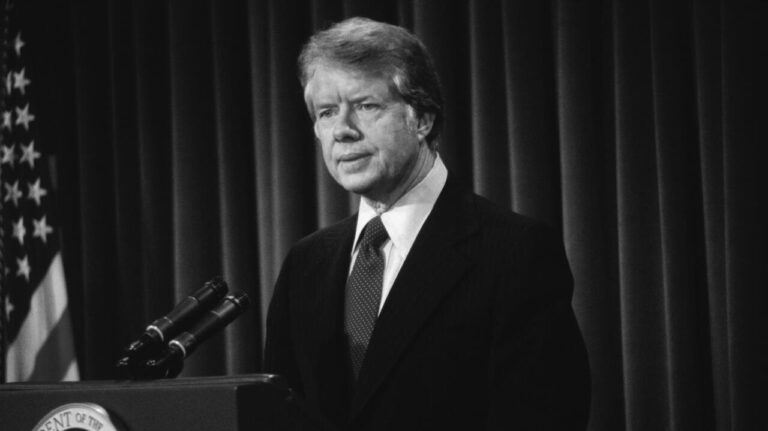Jimmy Carter, the former president of the United States, winner of the Nobel Peace Prize, died at the age of 100. Carter was the 39th president of the United States from 1977 to 1981.
Carter celebrated his 100th birthday in October. Then, in his native Georgia, a grand anniversary was celebrated – including a concert and the flight of fighter jets.
Jimmy Carter – Biography
James Earl Carter was born on October 1, 1924, in Plains, southwest Georgia, the son of peanut farmers and local store owners. In 1946, he graduated from the Annapolis Naval Academy, and until 1953, among others, he was an officer of submarines. servicing nuclear reactors of ships. After leaving the service, he took over part of his father’s farm, which grew peanuts, and as a wealthy businessman and member of a Baptist church known for his anti-racist views, he was elected to the Georgia state senate in 1962 and became active in started his political career. career In 1971, he became governor of the state and declared in his inaugural address that “the time of racial discrimination is over,” although he campaigned on occasional racist tones and successfully sought the support of the state’s conservative voters.
Just three years later, a little-known politician in the country, he announced his candidacy for the presidency and, despite initial mockery of his low popularity, defeated his Democratic primary rivals and then-President Gerald Ford. According to Donald Pienkos, a historian at the University of Wisconsin-Milwaukee, Carter owed his election victory to, among other things: the vote of the Polish public. These include: the impact of a televised election debate in which Ford claimed that Eastern Europe was not under Soviet rule and that he did not think “the Poles felt they were ruled by the USSR.”
As the former ambassador in Warsaw, Daniel Fried, who began his diplomatic career in the Carter administration, noted, the 39th US president made a great contribution to supporting the democratic opposition in Poland, leading to a radical change in Washington’s policy towards the Eastern bloc. His national security advisor Zbigniew Brzezinski played an important role in this.
Jimmy Carter at Rosalynn Carter’s funeral (November 2023) EVELYN HOCKSTEIN/Reuters/Forum
– Kissinger, who led the policies of Ford and Nixon, was conservative and believed in the principles proclaimed by Bismarck: stability through the balance of power. Brzezinski was a Pole. He believed in stability due to the democratic legitimacy of the authorities. In the end, he was also a realist, but what I remember from that time was the use of human rights as an ideological weapon against the Soviet Union, Fried said. He added that if Henry Kissinger remains the main architect of American policy, he probably won’t be interested in supporting solidarity as a destabilizing factor.
– Brzezinski – then Carter – recognized the potential in it, like the role of John Paul II. And while Kissinger and the former administration of the USA consider Poland and other countries to be just a part of the Soviet empire, Carter’s policy is based on a differential approach and treats each country participating in the Warsaw Pact separately, the diplomat said. He added that despite their differences, Ronald Reagan, who defeated Carter in the next election, largely continued this approach.
Warsaw, 1977. US President Jimmy Carter laid flowers on the grave of the unknown soldier Zbigniew Matuszewski/CAF/PAP
Crises during the presidency
However, in other areas, Carter’s presidency was not very successful and was marked by many domestic and foreign crises: stagflation (economic stagnation combined with inflation), the oil crisis, the accident at the Three Mile nuclear power plant, the Islamic revolution in Iran, and the invasion of the Soviet Union. Afghanistan. Although he achieved some successes as president – such as the Camp David accords, where he led to the recognition of the state of Israel by Egypt – his image was ultimately overshadowed by the crisis in Iran over the student attack on the US embassy. in Iran and the captivity of 55 employees for hostages. Despite imposing sanctions and a subsequent failed military attempt to rescue the prisoners, Carter was unable to release them until the end of his presidency. The Iranian regime, in an attempt to defeat Carter, who supported Iran’s deposed king and gave him asylum in the US when he died of cancer, released them on the first day of Reagan’s presidency, which defeated the incumbent president. President with the majority of the votes of the electorate: 489-49.
Carter was one of 10 U.S. presidents to serve only one term (Joe Biden would be the 11th) and has long been considered by historians to be one of the worst. These views have changed in recent years due to the changing historical perspective and his post-presidential activities.
Jimmy Carter (zdjęcie archiwalne) Universal History Archive/Universal Pictures Group via Getty Images
Activities after political career
After the election defeat, Carter returned to his hometown and retired from active politics. He devoted himself to social and humanitarian activities and was personally involved in the activities of the Christian organization Habitat for Humanity, which builds houses for the poor. He also founded the Carter Center, an organization dedicated to promoting peace, the rule of law, human rights, and the fight against infectious diseases. For his activities, he won the Nobel Peace Prize in 2002 and became the third American president in history after Theodore Roosevelt and Woodrow Wilson.
Despite his age, Carter was constantly involved in his activities. In 2014, he published his autobiography, also lectured at Emory University in Atlanta and taught religion to children in Sunday school at the Baptist Church.
Eventually, his health deteriorated and in February 2023 he entered hospice care, and was shocked by the death of his wife of 77 years, Rosalyn, a few months later.
Main image source: Getty Images

